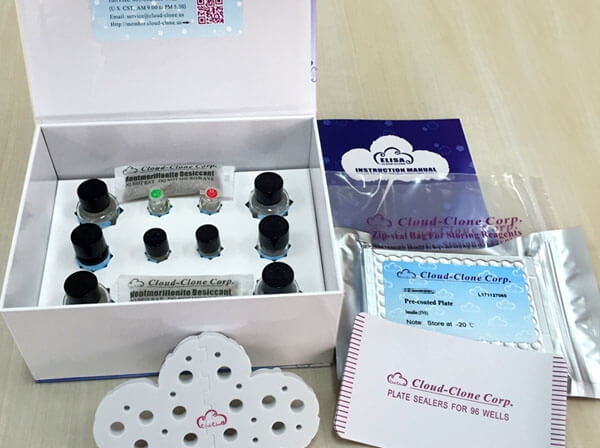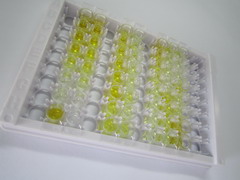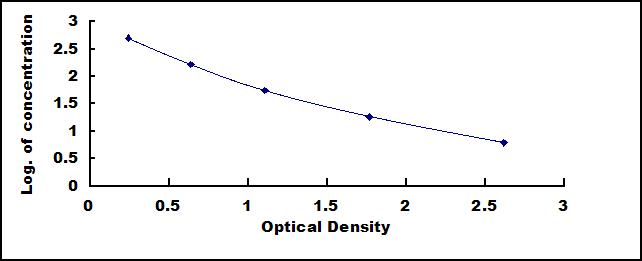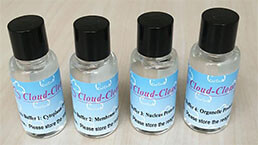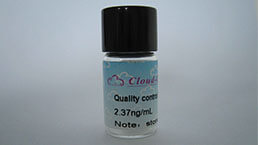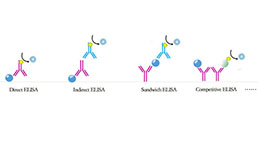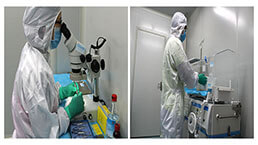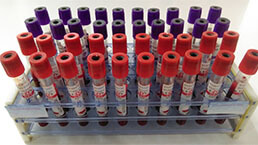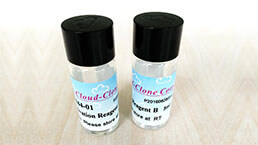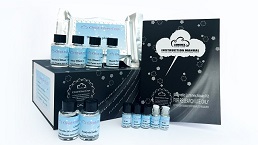ELISA Kit for Vasoactive Intestinal Peptide (VIP) 

PHM27; Intestinal peptide PHV-42; Peptide histidine valine 42; Peptide histidine methioninamide 27
- UOM
- FOB US$ 479.00 US$ 684.00 US$ 3,078.00 US$ 5,814.00 US$ 47,880.00
- Quantity
Overview
Properties
- Product No.CEA380Ra
- Organism SpeciesRattus norvegicus (Rat) Same name, Different species.
- ApplicationsEnzyme-linked immunosorbent assay for Antigen Detection.
Research use only - DownloadInstruction Manual
- CategoryEndocrinologyGastroenterologyHormone metabolism
Sign into your account
Share a new citation as an author
Upload your experimental result
Review

Contact us
Please fill in the blank.
Recovery
Matrices listed below were spiked with certain level of recombinant Vasoactive Intestinal Peptide (VIP) and the recovery rates were calculated by comparing the measured value to the expected amount of Vasoactive Intestinal Peptide (VIP) in samples.
| Matrix | Recovery range (%) | Average(%) |
| serum(n=5) | 86-101 | 89 |
| EDTA plasma(n=5) | 80-101 | 91 |
| heparin plasma(n=5) | 86-94 | 90 |
Precision
Intra-assay Precision (Precision within an assay): 3 samples with low, middle and high level Vasoactive Intestinal Peptide (VIP) were tested 20 times on one plate, respectively.
Inter-assay Precision (Precision between assays): 3 samples with low, middle and high level Vasoactive Intestinal Peptide (VIP) were tested on 3 different plates, 8 replicates in each plate.
CV(%) = SD/meanX100
Intra-Assay: CV<10%
Inter-Assay: CV<12%
Linearity
The linearity of the kit was assayed by testing samples spiked with appropriate concentration of Vasoactive Intestinal Peptide (VIP) and their serial dilutions. The results were demonstrated by the percentage of calculated concentration to the expected.
| Sample | 1:2 | 1:4 | 1:8 | 1:16 |
| serum(n=5) | 78-102% | 91-98% | 81-88% | 90-104% |
| EDTA plasma(n=5) | 93-101% | 78-103% | 90-97% | 80-93% |
| heparin plasma(n=5) | 87-94% | 99-105% | 83-103% | 80-104% |
Stability
The stability of kit is determined by the loss rate of activity. The loss rate of this kit is less than 5% within the expiration date under appropriate storage condition.
To minimize extra influence on the performance, operation procedures and lab conditions, especially room temperature, air humidity, incubator temperature should be strictly controlled. It is also strongly suggested that the whole assay is performed by the same operator from the beginning to the end.
Reagents and materials provided
| Reagents | Quantity | Reagents | Quantity |
| Pre-coated, ready to use 96-well strip plate | 1 | Plate sealer for 96 wells | 4 |
| Standard | 2 | Standard Diluent | 1×20mL |
| Detection Reagent A | 1×120µL | Assay Diluent A | 1×12mL |
| Detection Reagent B | 1×120µL | Assay Diluent B | 1×12mL |
| TMB Substrate | 1×9mL | Stop Solution | 1×6mL |
| Wash Buffer (30 × concentrate) | 1×20mL | Instruction manual | 1 |
Assay procedure summary
1. Prepare all reagents, samples and standards;
2. Add 50µL standard or sample to each well.
And then add 50µL prepared Detection Reagent A immediately.
Shake and mix. Incubate 1 hour at 37°C;
3. Aspirate and wash 3 times;
4. Add 100µL prepared Detection Reagent B. Incubate 30 minutes at 37°C;
5. Aspirate and wash 5 times;
6. Add 90µL Substrate Solution. Incubate 10-20 minutes at 37°C;
7. Add 50µL Stop Solution. Read at 450 nm immediately.

Test principle
This assay employs the competitive inhibition enzyme immunoassay technique. An antibody specific to VIP has been pre-coated onto a microplate. A competitive inhibition reaction is launched between biotin labeled VIP and unlabeled VIP (Standards or samples) with the pre-coated antibody specific to VIP. After incubation the unbound conjugate is washed off. Next, avidin conjugated to Horseradish Peroxidase (HRP) is added to each microplate well and incubated. The amount of bound HRP conjugate is reverse proportional to the concentration of VIP in the sample. After addition of the substrate solution, the intensity of color developed is reverse proportional to the concentration of VIP in the sample.
Giveaways
Increment services
Citations
- VIP gene variants related to idiopathic pulmonary arterial hypertension in Chinese populationWiley: source
- Low levels of vasoactive intestinal peptide are associated with Chagas disease cardiomyopathyPubmed: 23800435
- CGRP and VIP Levels as Predictors of Efficacy of Onabotulinumtoxin Type A in Chronic MigraineOnlinelibrary: head.12372
- Roles of sphincter of Oddi motility and serum vasoactive intestinal peptide, gastrin and cholecystokinin octapeptideNCBI: PMC4000510
- Increased VIP levels in peripheral blood outside migraine attacks as a potential biomarker of cranial parasympathetic activation in chronic migrainePubmed:24847167
- Clinical study of electro-acupuncture treatment with different intensities for functional constipation patientsPubmed:25318892
- Aqueous Fraction of Beta vulgaris Ameliorates Hyperglycemia in Diabetic Mice due to Enhanced Glucose Stimulated Insulin Secretion, Mediated by Acetylcholine and GLP-1, and Elevated Glucose Uptake via Increased Membrane Bound GLUT4 TransportersPubmed:25647228
- Aqueous Fraction ofPubMed: 25647228
- Oral curcumin has anti-arthritic efficacy through somatostatin generationPubMed: 25836921
- Effects of sphincter of Oddi motility on the formation of cholesterol gallstonesPubmed:27350732
- Effect of acupuncture on house dust mite specific IgE, substance P, and symptoms in persistent allergic rhinitisPubmed:27156748
- Relationship between serum levels of VIP, but not of CGRP, and cranial autonomic parasympathetic symptoms: A study in chronic migraine patientsPubmed:27250233
- No Change in Interictal PACAP Levels in Peripheral Blood in Women With Chronic Migrainepubmed:27634731
- Using the "target constituent removal combined with bioactivity assay" strategy to investigate the optimum arecoline content in charred areca nut.pubmed:28054652
- [6]-Gingerol, from Zingiber officinale, potentiates GLP-1 mediated glucose-stimulated insulin secretion pathway in pancreatic β-cells and increases RAB8/RAB10-regulated membrane presentation of GLUT4 transporters in skeletal muscle to improve hyperglycemia in Leprdb/db type 2 diabetic mice10.1186/s12906-017-1903-0
- Positive enhancement of Lactobacillus fermentum HY01 on intestinal movements of mice having constipation10.1007/s13765-017-0327-3
- Salivary neuropeptides, stress, and periodontitisPubmed:28914594
- Home-Based Transcutaneous Neuromodulation Improved Constipation via Modulating Gastrointestinal Hormones and Bile AcidsPubmed:29853946
- Vasoactive intestinal peptide degradation might influence Interleukin-17 expression in cardiac chagasic patientsPubmed: 30365640
- Serum Levels of Neuropeptides in Cows with Left Abomasal DisplacementPubmed: 30562932
- Protective Effect of Silkworm Pupa Oil on Hydrochloric Acid/Ethanol‐Induced Gastric UlcerPubmed: 30479041
- Serum CGRP, VIP, and PACAP usefulness in migraine: a case–control study in chronic migraine patients in real clinical practicePubmed: 32951099
- Disrupted local innervation results in less VIP expression in CF mice tissuesPubmed: 32600901
- Anti-Inflammatory and Pro-Inflammatory Neuropeptides in Dilative Cardiomyopathy are there Relations to Psychophysical Stress?
- Ganjiang granule regulates cecal microflora and serum biochemical components in a rat model of constipation-predominant irritable bowel syndrome
- VIP reduction in the pancreas of F508del homozygous CF mice and early signs of Cystic Fibrosis Related Diabetes (CFRD)34034984
- Significance of serum VIP and PACAP in multiple sclerosis: an exploratory case–control study34698942
- A clinical analysis on functioning pancreatic neuroendocrine tumors (focusing on VIPomas): a single-center experiencePubmed:35644576




